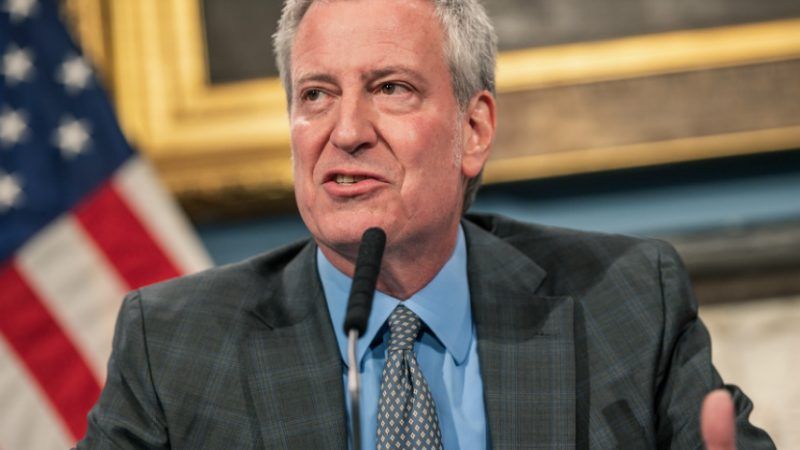The Biggest Victims of Progressives' Plastic Straw Laws Are the Workers They Normally Champion
New York City Mayor Bill de Blasio's anti-plastic executive order will be a pain for taxpayers and city workers alike.

Bill de Blasio is the latest politician to come out against single-use plastics. On Thursday, the New York mayor issued an executive order calling for city agencies to stop purchasing plastic foodware and replace it with supposedly greener alternatives.
"The villain here is big oil. The fossil fuel industry did this to us," said De Blasio at a press conference, standing at a podium adorned with a "Stop Plastic Waste, Stop Big Oil" sign. "Today, we say no to plastics. We say no to fossil fuels. We say yes to a better and fairer future."
That soaring rhetoric obscures a rather incrementalist policy. The mayor's executive order gives the agencies 120 days to prepare a plan outlining how they will stop spending city funds on "unnecessary single-use plastic foodware in favor of reusable, compostable, or recyclable alternatives," with the goal of ditching these plastic foodware purchases by the end of the year. But the order allows agencies to continue using plastic stuffs when there exists no practical non-plastic alternatives or when the agency has already signed a contract to purchase plastic foodware. Exceptions are also made for emergencies, and for when a person specifically requests a single-use plastic straw.
Getting rid of single-use plastics is part of the mayor's broader campaign to combat climate change. The executive order declares that burning fossil fuels "is toxic to New York City and the planet" and adds that "fossil fuels are an integral component to the production of single-use plastics."
As we know from plastic bag bans, however, the replacements for these items can often be much worse for the climate. According to a recent University of Sydney study, a paper bag would need to be reused three times before it is better for the climate than a single-use plastic bag. A cotton tote bag would have to be reused 131 times. There's a good chance that many of the paper replacements that New York City's government departments, city-run hospitals, and public schools will adopt will suffer from the same problems.
The biggest losers from de Blasio's policy—bigger even than the taxpayers who will have to pay for more expensive alternatives to plastic—are the 300,000 or so city workers who'll now have to make do with inferior paper straws or spend more time washing up their own cutlery or dishware in breakroom sinks.
Workers are, in general, an underappreciated victim of anti-plastic regulations. Just this week, the Los Angeles Times ran a story on life under L.A.'s straw-on-request law, which has seen some restaurants ditch straws entirely, producing lots of irritated—and irritable—diners. "Customers got upset," one server at a newly strawless restaurant told the Times. "It got to the point we purchased paper straws because we were getting so many complaints."
Rep. Devin Nunes (R–Calif.) famously tweeted angrily about having to ask for a straw while back in his district. I don't envy the person waiting his table.
At times, this has even resulted in violence against workers. Within days of St. Petersburg, Florida, implementing its straw-on-request policy, one particularly irate customer attacked a McDonald's employee after he had to walk up to the counter to ask for a straw.
De Blasio's own executive order, though not specifically about restuarants, does include a straw-on-request policy, mandating that departments subject to the order keep a cache of plastic straws on hand for anyone who specifically requests one—a provision I assume is aimed at school and hospital cafeterias and other cafés in government buildings.
The mayor also threw his support behind regulating the private provision of plastic foodware, saying at his press conference that "we need to get plastic foodware out of restaurants, out of stores. We need to get it out of our lives."
Removing plastic from our lives means adding extra grief to the lives of the food service workers who have to abide by the regulations. Spare a thought for them too, de Blasio.
Rent Free is a weekly newsletter from Christian Britschgi on urbanism and the fight for less regulation, more housing, more property rights, and more freedom in America's cities.


Show Comments (67)